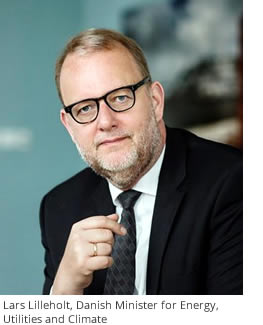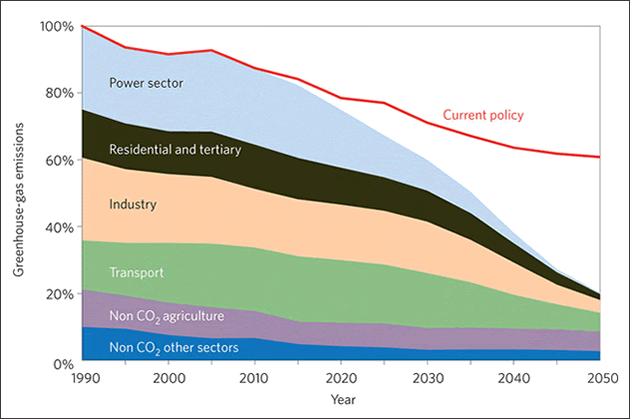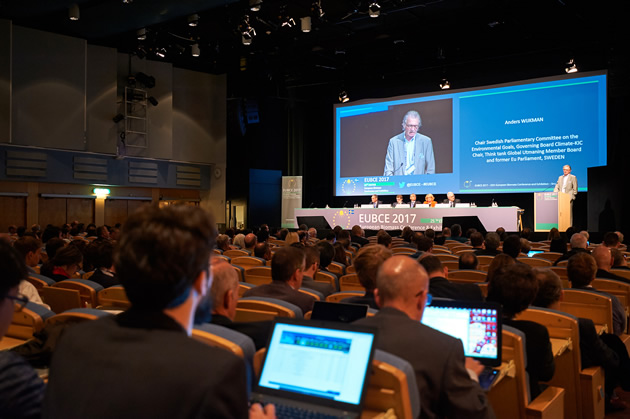 |
      |
| |
Denmark: A country focused on climate needs
|
 |
There is a country in the world where actions are in place to comply with climate needs according to the European Union goals for the near future. This is Denmark. Bioenergy contributes more than two thirds of the overall consumption of renewable energy in Denmark. Currently several large-scale power plants are being converted from fossil fuels to wood pellets, wood chips or straw. The production of biogas is increasing rapidly. Denmark plans to become independent of fossil fuels by 2050.
The active commitment of the country's authorities is clearly evident. In Denmark there is a Ministry taking care of nature and the environment and there is a Ministry leading the promotion of world class utility and energy services to support sustainable growth.
In terms of climate impact related to human activities, the Second Report on the State of the Energy Union of the European Commission reports that at EU28 level, the GHG avoided due to renewables since 2005 amounts to 8.1 % of total GHG emissions (i.e. 389 Mton CO2 equivalent), the equivalent to the annual emissions of Poland. The most significant GHG emissions avoided since 2005 due to renewable energy have been recorded for Sweden, Denmark, Finland and Austria. In a more detailed analysis, in the case of Sweden, Denmark and Finland, there has been a strong substitution of petroleum products consumption (oil represents more than half of all fossil fuels substituted in Sweden and Finland, and around 85% in Denmark).
 |
“If we are to ensure a cleaner, more energy-efficient future, more capital must be funnelled into clean energy investments. It is imperative that we bring together potential investors in green energy projects, not only here in Denmark but also across the rest of the world - particularly in emerging economies such as China, Mexico, India and Indonesia.”, says Lars Lilleholt, the Danish Minister for Energy, Utilities and Climate.
Mr. Lilleholt will deliver a speech during the EUBCE 2018 Opening Session, focused this year on “The Vital Role of Biomass for Climate Protection and Sustainable Development”.
Several speeches of the Opening Session will address applications of scientific research in industrial plants and processes taking into account policy guidelines and market perspectives.
|
EU's commitments for biomass implementation to limit climate change
|
 |
At the end of 2017, the European Commission took a decisive step forward in implementing the EU's commitments under the Paris Agreement for a binding domestic CO2 reduction of at least 40% by 2030. At the same time, as the international climate conference took place in Bonn, the Commission was showing that the EU is leading by example. This is in line with the long-term goal of building a competitive low carbon economy by 2050 and reducing Greenhouse Gas (GHG) emissions by 80-95% by 2050, compared to 1990 levels.
Commission President Jean-Claude Juncker outlined in the State of the European Union speech in September 2017: "I want Europe to be the leader when it comes to the fight against climate change. Last year, we set the global rules of the game with the Paris Agreement ratified here, in this very House. Set against the collapse of ambition in the United States, Europe must ensure we make our planet great again. It is the shared heritage of all of humanity."
Without firm global action to limit climate change, temperatures could increase by 2°C or more by 2050 and 4°C or more by 2100. To stay below 2°C every country will have to reduce its greenhouse gas emissions, but developed countries will need to take the lead by targeting a cut of 80-95% below 1990 levels by 2050.

Possible 80% cut in greenhouse gas emissions in the EU (100%=1990). Source: European Commission
The European Council and the European Parliament have endorsed this target range as an EU objective in the context of developed countries as a group making the reductions needed. Achieving these deep emission cuts will require a transition to a climate-friendly, low carbon economy.
In this context, energy from biomass is a significant component in the increase in renewable energy projected over the coming decades. Production of bioenergy should triple in the period 2010 to 2050 as Europe moves to a low carbon economy. Increased demand for bioenergy would be met mainly from increased biofuel production from agricultural crops and increased use of agricultural residues, woody biomass and waste materials. The increase in demand for bioenergy will have effects on the way land is used in the EU as bioenergy competes to a certain extent with other end uses such as production of food, animal feed, paper and timber. The inter-relationships between the energy, forestry and agricultural sectors are complex, and uncertainties are large. This issue will require continued follow-up.
Climate and sustainability in EUBCE 2018 conference sessions
|
 |
Talking about climate change implies that we have to take into consideration also the sustainability of actions proposed considering their effects, benefits and impacts.
The challenges and opportunities arising from the sustainable use of biomass for mitigating climate impacts are addressed in Tuesday’s Plenary Session: BP1. Climate and Sustainability, Tuesday 15 May 2018, 10:15-12:35

This session will feature presentations focusing on the lessons learned from LCA, ILUC mitigation and climate benefits from bioenergy in agriculture and forestry, as well as sustainability governance and socio-economic impacts of support provided to biofuels.
Many other conference sessions, both oral and visual, and hosted events will discuss the themes related to climate change and environmental impacts in the context of a sustainable biomass production and utilisation, by highlighting how biomass potential, resource availability and bioenergy production may be impacted by climate change and may impact on it.
   
More information on www.eubce.com
|
|
|
|
|
|
|
|
|
|
|
|
|
|
|
|
|
|
|
| |
INSTITUTIONAL BIOMASS INDUSTRY COOPERATION
|
|
|
|
|
|
|
|
|
|
|
|
|
|
|
|
|
|
|
|
|
|
|
|
|
| |
Organised by
|
with the support of
|
|
|
|
|
|
|






